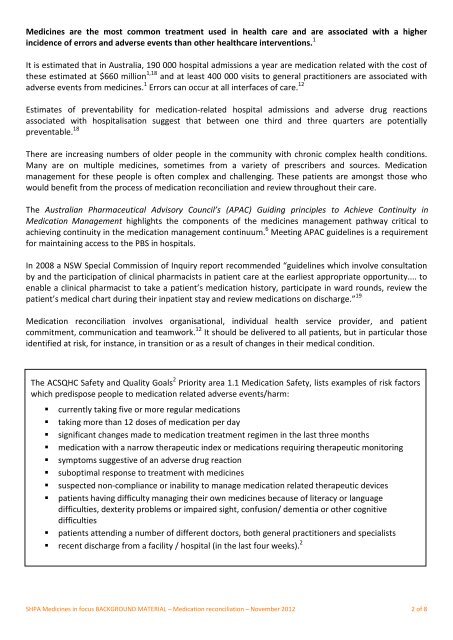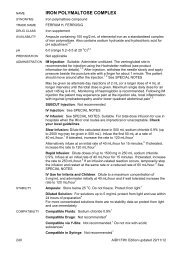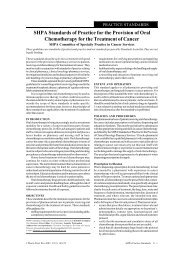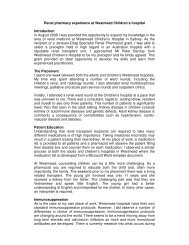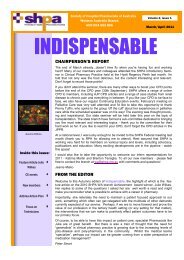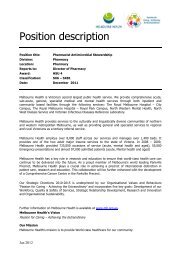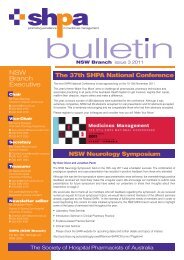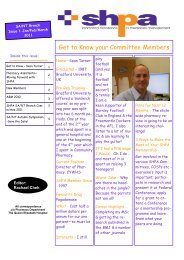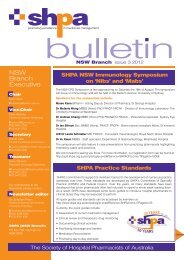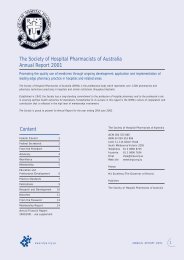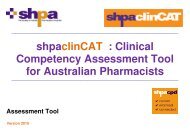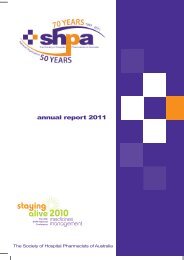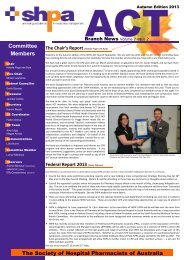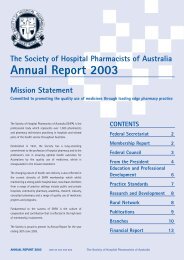references and background material - The Society of Hospital ...
references and background material - The Society of Hospital ...
references and background material - The Society of Hospital ...
You also want an ePaper? Increase the reach of your titles
YUMPU automatically turns print PDFs into web optimized ePapers that Google loves.
Medicines are the most common treatment used in health care <strong>and</strong> are associated with a higher<br />
incidence <strong>of</strong> errors <strong>and</strong> adverse events than other healthcare interventions. 1<br />
It is estimated that in Australia, 190 000 hospital admissions a year are medication related with the cost <strong>of</strong><br />
these estimated at $660 million 1,18 <strong>and</strong> at least 400 000 visits to general practitioners are associated with<br />
adverse events from medicines. 1 Errors can occur at all interfaces <strong>of</strong> care. 12<br />
Estimates <strong>of</strong> preventability for medication-related hospital admissions <strong>and</strong> adverse drug reactions<br />
associated with hospitalisation suggest that between one third <strong>and</strong> three quarters are potentially<br />
preventable. 18<br />
<strong>The</strong>re are increasing numbers <strong>of</strong> older people in the community with chronic complex health conditions.<br />
Many are on multiple medicines, sometimes from a variety <strong>of</strong> prescribers <strong>and</strong> sources. Medication<br />
management for these people is <strong>of</strong>ten complex <strong>and</strong> challenging. <strong>The</strong>se patients are amongst those who<br />
would benefit from the process <strong>of</strong> medication reconciliation <strong>and</strong> review throughout their care.<br />
<strong>The</strong> Australian Pharmaceutical Advisory Council’s (APAC) Guiding principles to Achieve Continuity in<br />
Medication Management highlights the components <strong>of</strong> the medicines management pathway critical to<br />
achieving continuity in the medication management continuum. 6 Meeting APAC guidelines is a requirement<br />
for maintaining access to the PBS in hospitals.<br />
In 2008 a NSW Special Commission <strong>of</strong> Inquiry report recommended “guidelines which involve consultation<br />
by <strong>and</strong> the participation <strong>of</strong> clinical pharmacists in patient care at the earliest appropriate opportunity.... to<br />
enable a clinical pharmacist to take a patient’s medication history, participate in ward rounds, review the<br />
patient’s medical chart during their inpatient stay <strong>and</strong> review medications on discharge.” 19<br />
Medication reconciliation involves organisational, individual health service provider, <strong>and</strong> patient<br />
commitment, communication <strong>and</strong> teamwork. 12 It should be delivered to all patients, but in particular those<br />
identified at risk, for instance, in transition or as a result <strong>of</strong> changes in their medical condition.<br />
<strong>The</strong> ACSQHC Safety <strong>and</strong> Quality Goals 2 Priority area 1.1 Medication Safety, lists examples <strong>of</strong> risk factors<br />
which predispose people to medication related adverse events/harm:<br />
• currently taking five or more regular medications<br />
• taking more than 12 doses <strong>of</strong> medication per day<br />
• significant changes made to medication treatment regimen in the last three months<br />
• medication with a narrow therapeutic index or medications requiring therapeutic monitoring<br />
• symptoms suggestive <strong>of</strong> an adverse drug reaction<br />
• suboptimal response to treatment with medicines<br />
• suspected non-compliance or inability to manage medication related therapeutic devices<br />
• patients having difficulty managing their own medicines because <strong>of</strong> literacy or language<br />
difficulties, dexterity problems or impaired sight, confusion/ dementia or other cognitive<br />
difficulties<br />
• patients attending a number <strong>of</strong> different doctors, both general practitioners <strong>and</strong> specialists<br />
• recent discharge from a facility / hospital (in the last four weeks). 2<br />
SHPA Medicines in focus BACKGROUND MATERIAL – Medication reconciliation – November 2012 2 <strong>of</strong> 8


